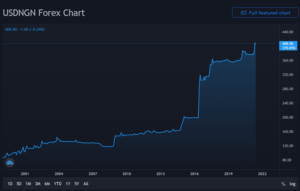
Trading in the highly aggressive cryptocurrency market has turned into a global trend in the last few years, especially since the start of the pandemic in 2020. The constantly towering trading volumes in crypto markets suggest increased participation by the masses all over the globe.
There has been a huge increase in the participation by the millennial retail traders in the high-risk crypto market. Despite the risks involved, young retail traders in Africa have shown a keen interest in the prospect of cryptos over the conventional stock and the bond market.
Tweets from celebrities and coverage by major media publications have helped cryptocurrencies to become the talk of the town all over the world. After the skyrocketing in Dogecoin prices in 2021 fuelled by speculation, no one can accurately predict what the future holds for cryptocurrencies, but the present is surely attracting millions of speculators each day.
Crypto trading apps like Binance and Luno have been gaining exceptional popularity in Nigeria, South Africa & Rest of Africa. The number of African P2P traders on Binance was increased by more than 2000% while Luno added 6 million new African clients from January 2020 to January 2021.
However, cryptocurrencies are volatile instruments that include lofty risk factors. Many newcomers enter the market with the temptation of getting rich in the short term unaware of the fact that it can also deplete out their investments significantly within days.
Why are Cryptos Popular in Africa?
Adoption of cryptos is said to be one of the highest in Africa. Nigeria is ranked among the top 3 nations all over the world in terms of cryptocurrency trading adoption. Each crypto trading platform in Nigeria has witnessed a remarkable spike in trading volumes.
Estimates suggest more than USD 400 million worth of cryptocurrencies have been traded in Nigeria during 2020. Similarly, South Africa has also witnessed a huge rise in crypto trading. These 2 counties are the biggest crypto markets in Africa, but the other countries too have seen huge surge in the last one year.
The following reasons have contributed majorly to this outstanding surge of crypto trading figures in African nations.
1. Unstable Local Currencies: The currencies of fast-developing African countries are extremely unstable compared to American and European currencies. The Nigerian currency Naira has depreciated more than 100% against USD since March 2016, and it was further devalued in 2021, and it is expected to drop further according to market experts.

Due to the constant depreciation of currencies, inflation becomes a burdening issue for countries dependent on imports. This is led to many people in Africa to store their money in Bitcoin instead of holding their local currency, due to fear of devaluation in Fiat currencies.
Since April 2020, cryptocurrencies like Bitcoin are not only holding the buying power against diminishing African currencies but have increased their value.
2. Ease of Access: The necessity to work from home turned into propensity during the Covid-19 pandemic. While many young people have lost their existing jobs & are finding it hard to find new jobs. This is surely one of the reasons why many youngsters are getting attracted to the potential high-reward capital markets as a side income.
African Broker comparison website Forex Brokers South Africa tells “Unlike many legacy platforms, Crypto trading apps have made it really easy for new users to signup, and start buying or selling cryptos in just a few minutes. There is an element of gamification in these apps, like clean charts, buttons to buy/sell with a single click etc.”
The crypto wallets and trading apps have made their interface as easy as possible for general public. This has enabled effortless buying, selling, sending, and receiving cryptos at very low fees; without actually having to understand the instrument; and this has promoted crypto trading to the masses.
The simplicity of the trading apps and similarities to existing money wallet apps is one of the main reasons why more and more traders are able to participate in the high-risk venture at ease.
3. Remittance: For many individuals working outside their African nation, sending money back to their homes has always been an issue. Traditionally, it has been really expensive to remit money to Africa from developed countries, and fees could go to as high as 10% or more.
Due to the lack of other cheaper options and with the increased ease of crypto transactions in Western countries, cryptocurrencies have gained popularity for sending remittances to and from Africa. Popular apps like Bitpesa are offering remittance services in African nations using bitcoin as a medium of transfer. This method of money transfer evades currency conversion fees and is comparably less costly than any other remittance methods like wire transfers.
4. Higher Returns: Cryptocurrencies have seen comparatively higher returns compared to capital markets in Africa.
10,000 USD invested in Bitcoin in March 2017 and March 2020 have roughly become 3,00,000 USD and 70,000 USD by today respectively.
The cryptocurrency returns are gigantic when compared with the FTSE All Share Index of Johannesburg Stock Index, which is the the largest stock index in Africa.
10,00 USD invested in JSE FTSE All Share Index in March 2017 and March 2020 would have roughly become 13,000 USD and 18,000 USD respectively. Although there is a major difference in the risk factors possessed by both instruments, since crytos are much riskier, but adding the return prospect, the risk to reward has been much better for cryptocurrencies during this period.
This has attracted especially the young people in Africa, who have higher risk appetite, to invest their money in cryptos instead of local stocks & index.
5. Young Population: Most of the African nations have a large proportion of the young population. In Nigeria, nearly 80% of the population is aged less than 40 while more than 65% are aged less than 30. These youngsters, when entering capital markets, generally seek higher rewards as they are ready to take higher risks compared to older traders and investors. Countries with a higher young population have witnessed a higher increase in crypto trading volumes compared to their counterparts.
What are the Risks?
The growing trend of crypto trading also involves significant risk elements that must be considered before entering the market.
We do not know what the future holds for cryptocurrencies, but it is quite frequent to find experts suggesting not to invest in cryptos. The regulations, overvalued price, speculation, etc for cryptocurrencies have always been questioned since their inception.
Following are the major risk factors involved in the Crypto market in Africa.
Regulatory Challenges: Cryptocurrencies are not governed by any government authority or a company. It is a decentralized currency spread over networks and is always subject to face regulatory challenges.
Nigeria, which is one of the largest crypto markets in the world and largest in Africa, also faced regulatory challenges recently. Many other African countries including Malawi have not legalized cryptos, and they remain illegal.
Several countries over the globe have imposed strict ban on cryptocurrencies multiple times. While the Central Banks & Governments can only restrict the transactions of cryptos through banks, P2P methods can still be used to trade cryptos in countries where crypto trading is banned. But this is a huge riks for investors, when dealing in an unregulated environment.
A sudden crypto ban in any country not only pulls down the crypto prices, but may also halt withdrawals to the local bank account. The risk of liquidating the cryptocurrencies will always prevail until it gets fully accepted and legalized.
Price Volatility: Since the beginning, almost every major cryptocurrency has shown dramatic upward as well as downward price movement. It is a very volatile market compared to other instruments.
The price movement depends on multiple reasons all over the world. As cryptos are not backed by any physical asset, the price is totally driven by public sentiment of it’s value & demand, and a sudden news can create huge downturn in price movement.
Recently in May 2021, the cryptocurrency market saw one of it’s biggest monthy drop, eroding billions in value. From an all-time high of $65,000, the Bitcoin/USD prices plunged below $36,000 in a single month.
The price drop in many other cryptocurrencies was far severe. The one-month drop was dramatic but Bitcoin has witnessed similar price drops in it’s history. One such price drop was seen from December 2017 to January 2019 when the price dropped from $20,000 to $3,500.
Scams: After knowing about the possible gigantic gains, many individuals invest without proper knowledge of the source.
The fear of missing out facilitates newcomers to enter the crypto market through non-reliable apps and trading platforms. The scammers take advantage of the growing trend and sometimes also lure the common public by offering attractive bonuses and fake promises of guaranteed returns.
FTC in US reported in May 2021, that the number of reports related to cryto scams have risen sharply & more than 7,000 people have reported scams worth $80 million related to cryptocurrencies since October 2020.
The scams related to cryptocurrencies are increasing at an even higher rate than the market caps and prices themselves. General public in Africa have increasingly been the target of crypto related HYIP scams & have been estimated to have lost millions, but there is no reported data on actual total losses by authorities in most African countries.
The Future
How the regulations for cryptos change in Africa remains to be seen. But the stance by many African governments seems to be on the side of ban & caution, rather than regulation, for now atleast.
Also, the volatile nature of the cryto markets mean than most retail investors are at the risk of losing. So, investors should use caution & never invest all their savings in cryptos.














